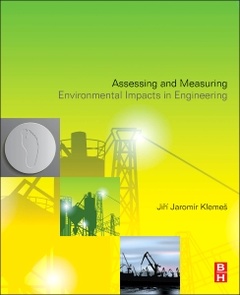Description
Assessing and Measuring Environmental Impact and Sustainability
Coordinator: Klemeš Jiří Jaromír
Language: English
Subject for Assessing and Measuring Environmental Impact and...:
Keywords
Bayes theorem; Bioethanol; Biogeochemical cycles; Biomass network; Built environment; Carbon emission reduction; Carbon footprint; Carbon sources and demands; Case study; Communities; Commuter transportation; Corporate social responsibility; Cumulative energy demand; Dynamic order; Eco-design; Ecological footprint; Ecological process evaluation; Embodied energy; End-of-pipe solution; Energy efficiency; Energy return on investment; Energy supply and demand; Environmental performance point; Environmental performance strategy map; Environmental sustainability; Euclidean distance; Fisher information; Forecasting; Game theory; Green design; Green engineering; Green supply chain; Greenhouse gas emissions; Indicator selection; Indicators and indices; Industrial ecology; Input-output analysis; Input-output modeling; Integrated LCA approach; Ito processes; Leading indicators; Life cycle analysis; Life cycle assessment; Low carbon emissions; Metric; Microalgal biofuels; Multilevel criteria analysis; National systems; Nitrogen footprint; Partial least-squares variable importance in projection; Process optimization; Product transparency; Rating systems; Regime shifts; Regional systems; Renewable energy; Stationery point sources; Stochastic optimal control; Strategic decision-making process; Supply chain; Supply chain network synthesis; Sustainability; Sustainability assessment; Sustainability indicator; Sustainability indicators; Sustainability metrics; Sustainable Process Index; Sustainable brownfield redevelopment; Sustainable cities; System boundary; Transit-oriented development; Triple bottom line; Uncertainty; Urban efficiency; Urban resilience; Urban sustainability; Urban systems; Urban tools; Water footprint; Water footprint assessment; Water pricing; Water risk; Water stewardship
608 p. · 19x23.3 cm · Hardback
Description
/li>Contents
/li>Readership
/li>Biography
/li>Comment
/li>
Assessing and Measuring Environmental Impact and Sustainability answers the question ?what are the available methodologies to assess the environmental sustainability of a product, system or process? Multiple well-known authors share their expertise in order to give a broad perspective of this issue from a chemical and environmental engineering perspective. This mathematical, quantitative book includes many case studies to assist with the practical application of environmental and sustainability methods. Readers learn how to efficiently assess and use these methods.
This book summarizes all relevant environmental methodologies to assess the sustainability of a product and tools, in order to develop more green products or processes. With life cycle assessment as its main methodology, this book speaks to engineers interested in environmental impact and sustainability.
Introduction
Systems analysis approach to sustainability
On the Application of Fisher Information to Environmental and Engineering Problems
SPI - Sustainable Process Index
Going to a Decision point in Sustainability Analyses
Overview of Environmental Footprints
N footprint and the nexus between C and N footprints
The Water Footprint of Industry
Life cycle sustainability aspects of microalgal biofuels
Methods and tools for sustainable chemical process design
The Built Environment and Embodied Energy
The Environmental Performance Strategy Map: An integrated LCA approach to support the strategic decision-making process
Sustainable Design through Process Integration
Supply and Demand Planning and Management Tools Towards Low Carbon Emission
Setting a policy for sustainability: the importance of measurement
Sustainability assessment of buildings, communities and cities
Head of a Centre of Excellence “Sustainable Process Integration Laboratory – SPIL, NETME Centre, Faculty of Mechanical Engineering, Brno University of Technology - VUT Brno, Czech Republic.
Previously the Project Director, Senior Project Officer and Hon Reader at Department of Process Integration at UMIST, The University of Manchester and the University of Edinburgh, UK Founder and a long-term Head of the Centre for Process Integration and Intensification – CPI2, University of Pannonia, Veszprém, Hungary. Awarded by the EC with Marie Curie Chair of Excellence (EXC). Track record of managing and coordinating 97 major EC, NATO, bilateral and UK Know-How projects. Research funding attracted over 46 M€.
Co-Editor-in-Chief of Journal of Cleaner Production (IF 2020 = 9.297) and Chemical Engineering Transactions, Editor in Chief Cleaner Technologies and Engineering and Cleaner Chemical Engineering (Elsevier); Subject Editor of Energy (IF 2020 = 7.147) Managing Guest Editor of Renewable and Sustainable Energy Reviews (IF 2020 = 14.982). The founder and President of 25 y of PRES (Process Integration for Energy Saving and Pollution Reduction) conferences. Seven years Chairperson of CAPE Working Party of European Federation of Chemical Engineering, a member of WP on Process Intensification. A Member of the IChemE, UK, Sargent Medal International Committee on CAPE. Awarded by the Web of Science and Publons as a Highly Cited Researcher, Top Peer Reviewer and Top Handling Editor. He authored and co-authored 792 papers (WoS) in 106 scientific journals, h-index in Google Scholar 78, Scopus 67, PUBLONS (WoS) 61. His Publons profile (Web of Science) has 2,552 reviews for 186 scientific journals and 17,020 Editor Merits for 24 Editorial boards.
Invited lecturer at 68 universities, 14 Distinguished Visiting Professor, 6 Doctor Honoris causa, 36 PhD students, 44 Expert Evaluat
- Helps engineers to assess, evaluate, and measure sustainability in industry
- Provides workable approaches to environmental and sustainability assessment
- Readers learn tools to assess the sustainability of a process or product and to design it in an environmentally friendly way



